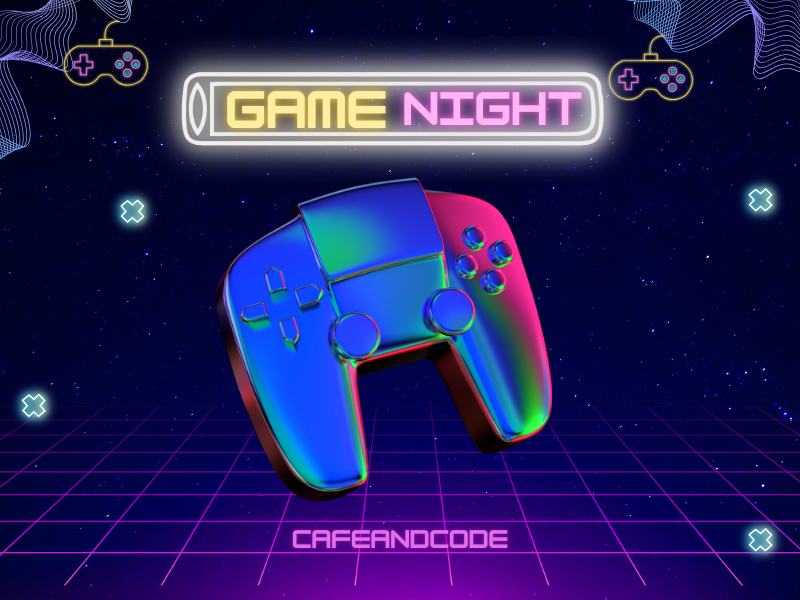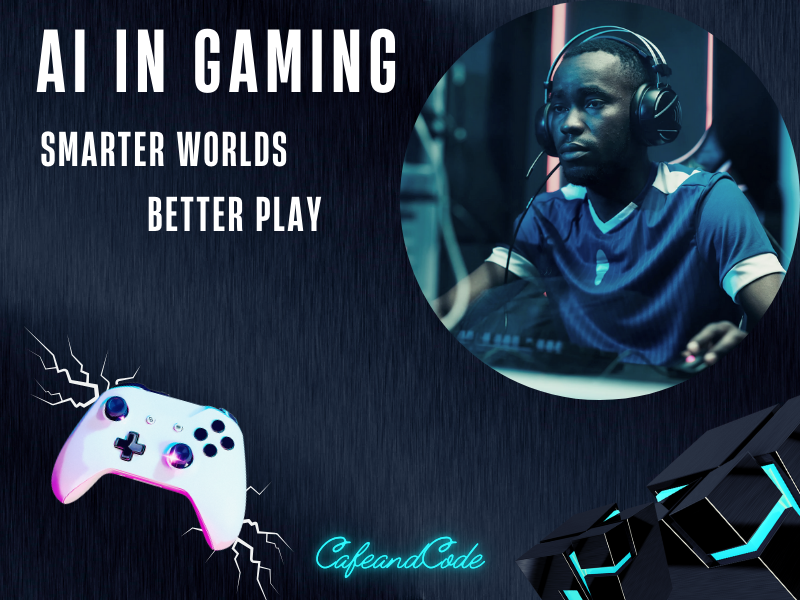Table of Contents
Introduction
Overview of AI in gaming
AI in gaming is emerging and playing very important role in modern gaming, carrying notable improvements in player experiences and gameplay controls equally. AI in games used to be restricted to basic, pre-programmed actions, but these days it allows games to produce real-world challenges, resulting in more dynamic and realistic interactions. Artificial intelligence (AI) has completely changed the way games are made and played, from making non-player characters (NPCs) behave better to building huge randomly generated scenes.
How AI is Transforming the Gaming Industry
AI is reshaping the gaming industry in several key ways:
1.) Enhanced Realism: AI in gaming allows game designers to create more realistic settings and characters, resulting in a more immersive and realistic gaming experience.
2.) Customized Gaming: Personalized experiences that attract and encourage players according to their skill levels are created by AI in adaptive gameplay, which responds to player behavior.
3.) Random Content Creation: AI creates original plots, maps, and levels, decreasing the need for human creation and increasing the possibility of infinite gameplay.
4.) AI-Driven Narrative and Dialogue: AI in gaming may now create dialogue and stories on its own depending on the decisions and actions of the user. This can be seen via branching stories in games like Detroit: Become Human, where AI modifies the plot in response to player choices.
AI in Non-Player Characters (NPCs)
Evolution of NPC Behavior Using AI in Gaming
Fixed scripts were followed by early NPCs, which resulted in predictable and repeated behaviour. But when AI came, it has made it possible for NPCs to operate in more complex and realistic ways, responding to player decisions and the surroundings. This development makes for a more realistic and engaging game experience.
Adaptive NPCs: Learning from Player Behavior
NPCs with AI nowadays are able to pick up new skills through player interactions. To maintain the game’s challenge and freshness, NPCs can modify their strategy in response to a player’s frequent employment of particular methods. This flexibility makes for more engaging games by providing dynamic challenges that change with time.
AI-Driven Realism in NPC Decision-Making
In real-time, AI helps NPCs in making more human-like judgments when interacting with other characters, responding to dangers, and going through challenging environments. Because of the more realistic and unpredictable interactions brought about by this AI-driven realism, NPCs feel like actual players in the game environment.
Procedural Content Generation
Dynamic World Creation through AI
AI makes it possible to automatically generate game worlds, which frees up human design time to create large, unique environments. This produces dynamic, constantly-evolving environments that provide new experiences with every game.
AI-Generated Levels, Environments, and Assets
AI creates environments, buildings, and in-game objects in place of pre-built levels, creating a variety of surprising landscapes. This method is used in games such as No Man’s Sky to generate vast and diverse universe.
Engaging Worlds through Procedural Generation
Procedural generation keeps users engaged by constantly producing fresh content. It offers them an infinite range of experiences that feel authentic and engaging, avoiding lack of interest and improving realism.
AI in Game Difficulty & Customization
AI’s Role in Adapting Difficulty Levels
In order to provide players of different skill levels with a balanced experience, AI dynamically modifies game difficulty based on the player’s performance, making sure tasks are neither too simple nor too hard.
Customized Gaming Experiences Using AI & Data Analysis
AI customizes gameplay by evaluating player behavior and preferences. This allows the game to adjust targets, rewards, and interactions to each player’s unique playstyle, increasing player involvement.
Real-Time Adjustments for Skill-Based Gaming
AI adjusts in-game elements in real-time, such as resource availability and enemy strength, in response to player actions. This creates a skill-based, adaptive challenge that changes as the player improves his/her gaming skills.

AI in Multiplayer and Online Games
AI’s Role in Matchmaking and Player Behavior Prediction
By matching players with equal skill levels, AI evaluates player skills and conduct to produce balanced pairings that guarantee fair and competitive games.
Bots in Online Games: Learning and Adapting Like Human Players
AI in gaming uses bots to copy human behavior by learning from players’ activities and giving tough competition to opponents or standing in for unavailable human players to preserve the integrity of the game.
AI Anti-Cheat Systems and Fair Gameplay
By quickly recognizing and blocking dishonest techniques, artificial intelligence (AI) ensures fair gameplay and improves the integrity of online games by detecting cheating tendencies and abnormal actions in real-time.
AI in Game Narratives
AI-Driven Storytelling: Dynamic and Responsive Narratives
AI creates dynamic, customized storylines that change in real time to improve user experience by customizing game narratives(stories) based on player actions.
AI-Generated Dialogue and Character Development
Characters may now interact realistically and change in response to interactions thanks to AI, which makes more interesting and in-depth character development throughout the game.
The Future of Interactive and Branching Storylines
With each new game, player decisions in complex, branching plots with AI-driven evolution are producing highly dynamic and unique storytelling experiences.
AI for Enhanced Graphics and Visual Realism
AI-Powered Graphics Processing and Optimization
AI enhances visual quality and performance to generate graphics more smoothly and carefully while putting less pressure on hardware.
Realistic Lighting, Shading, and Particle Effects Using AI in Gaming
AI produces complex particle, lighting, and shading effects that give video games a more realistic and engaging visual appearance.

Future Trends in AI Gaming
AI in Virtual Reality (VR) and Augmented Reality (AR) Gaming
AI improves virtual reality (VR) and augmented reality (AR) experiences by building more dynamic and complex environments that allow for realistic item interactions and realistic virtual characters.
How AI Will Shape the Next Generation of Game Development
AI will promote innovation in game design, improving generative content creation, player customization, and detailed narratives with flexible gameplay.
Challenges and Ethical Considerations of AI in Gaming
Fairness, abuse prevention, and data privacy are just a few of the issues that the growing usage of AI in gaming presents, all of which call for careful supervision in order to maintain ethical standards.
Conclusion
Recap of AI’s Impact on Gaming Realism and Player Experience
Because AI can create dynamic worlds, variable difficulty levels, interacting narratives(stories), and more realistic NPC(Non-Players Characters) behaviors, gaming has been greatly improved. The player experience is made richer and more engaging by these improvements.
The Future Potential of AI in Gaming
Predicting future developments in technology, AI will further transform gaming by providing more realistic simulations, creative gameplay experiences, and a greater degree of customization all while pushing the boundaries of what is possible for games to achieve.

Frequently Asked Questions(FAQ’s)
1.) How is AI used in gaming?
AI is used in games to customize the player experience, modify game difficulty, create dynamic environments, and control non-player characters (NPCs). AI systems are also capable of creating interactive stories, producing real-time physics, and optimizing visuals.
2.) What is procedural content generation in games?
Using AI to automatically build game assets like levels, scenery, and characters is known as procedural content creation. This enables game creators to create expansive, dynamic game worlds that change with each playtime and present new experiences.
3.) What are the future trends for AI in gaming?
Future developments will include the use of AI in VR/AR to produce more engaging settings, advanced automated generation for bigger, more dynamic worlds, and ethical concerns to guarantee fair and responsible use of AI in video games.
4.) What are the ethical concerns surrounding AI in gaming?
Ensuring justice in AI-driven game dynamics, protecting player data privacy, and stopping AI from facilitating dishonest or misleading online gaming behaviors are some ethical problems.
5.) How does AI enhance graphics in video games?
AI improves graphics through better computing methods, texture optimization, animation improvement, and the creation of realistic lighting and shadows, all of which result in visually attractive and realistic gaming worlds.

